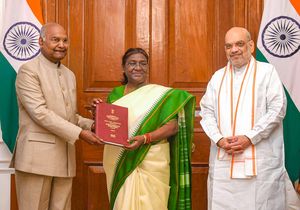The Ram Nath Kovind committee wasn’t asked to check if it was a good idea to hold polls to the Lok Sabha, the assemblies, the town councils and the village panchayats in one go. The government knew it already. The charter given to them was to suggest how to do it. Rulers these days are like that. They know what’s good for us; they need advice only on how to do the good.
As discussed in this column earlier, our current rulers think we are voting too often. We waste a lot of time, energy and money by being in poll mode constantly. Every year we have a round or more of polls to one or more legislatures. The PM and ministers get distracted, the model code freezes development governance, economy slows down, the police and the paramilitary get burdened, illegal money corrupts the polity and so on.
Look at the Yanks. They vote on the second Tuesday of every leap year November, come hell, highwater, world war or bin Laden; inaugurate the new president on the next January 20th; and let him rule or ruin them for the next four years. No questions asked, no no-confidence motions moved, no mid-term polls held.
Kovind and Co didn’t copy-paste the US model, but worked around it. They say, in the next five years we should amend a whole lot of articles in the Constitution and hold polls to the Lok Sabha, 28 state and three UT assemblies together in 2029, and to municipalities and panchayats in the next 100 days. The President will decide a date on which the Lok Sabha should get constituted, and declare it sacrosanct. All future Lok Sabhas and assemblies will scramble to be constituted on that day every five years.
What if spoilsports in one state blot the copybook, and pull down a regime in the fourth year? Simple. Ask the voters in that state to vote another assembly for the remaining one year. The same about the Lok Sabha. If a Lok Sabha sinks midstream, elect another Lok Sabha for the rest of the five-year term. In the fifth year, get all the voters all over the country to elect another Lok Sabha, 28+3 assemblies and a few lakh panchayats and town councils.
The status-quoists have fundamental counters. People elect an MP for one set of reasons, and an MLA for another. They may like one party to rule India, another to rule their state. The politics of both are different, so are voters’ priorities. A party that lost to the Lok Sabha may still convince the voter that it can rule a state well. That calls for a different campaign atmosphere. That way, the system gives choices not just to the party, but to the voters, too. The voter gets to hear several reasonings put to him in varying ways to make informed choices. Democracy should widen the choices, not limit them.
But didn’t we start with same-time polls? Indeed, we did in 1952 and 1959, but by default. The dynamics of politics upset the pattern in 1959-60 when the Kerala assembly was sacked and mid-term polls held in 1960. Odisha followed suit. Since then assemblies and Lok Sabhas have been leading their own separate lives, cooperating, conflicting, and cooexisting, but rarely coterminating.
Tailoring the terms of assemblies to suit the central legislature's goes against the fundamental principle of federalism. Democracy is not a commodity to be valued in monetary terms or growth rate percentages. Elections are not a necessary evil, but an essential good by which deprived classes get politically empowered. Elections are part of the social amritmanthan for obtaining the nectar of social and political good.
Finally, which is more sacrosanct—the vote or a date?
prasannan@theweek.in


